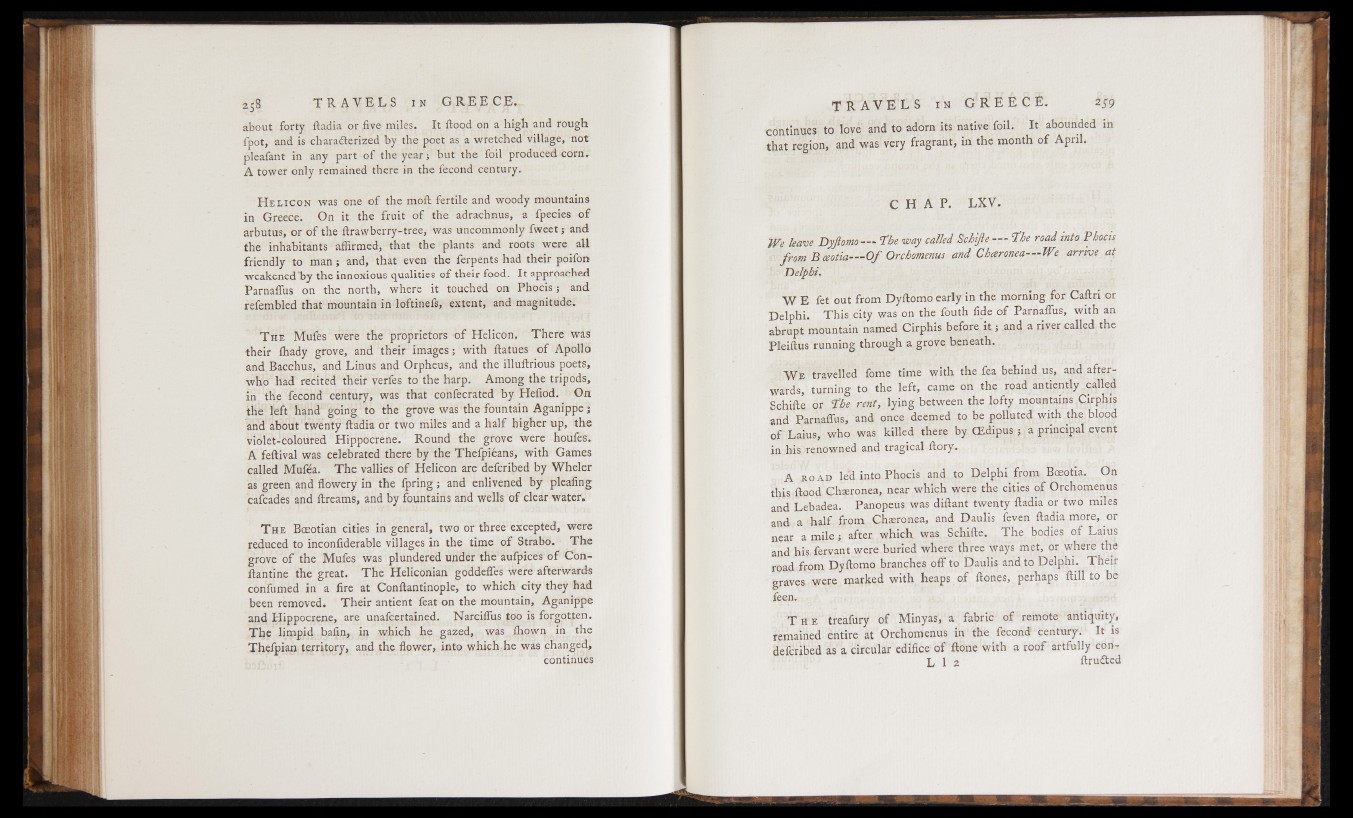
àbout forty ftadia or .five milçs» It ftqod^ on a high and rough
fpot, and Is characterized by the poet as a wretched'village, not
pleafant in any part of the year f but the ‘ foil produced corn;
A tower only remained there in the fécond century.
Helicon was one. o f the moft fertile and woody mountains
in Greece. On it the fruit*©€ the adrachnus, a fpecies of
arbutus, or of the ftrawberry-tree,- was tfncommonly fweet j- and
the inhabitants affirmed* that the plants and roots were all
friendly to man ; and, that even the ferpents had théîr poifon
weakened*by the innoxious qualities of their food. It approached
Parnaffus on the north, where it touched-on Phocis j and
refembled that mountain in loftinefs, extent* and magnitude.
T hM ' 'M É s sw ëft the pföbriètors -bf HeKedri|? Thefts w is
their fhady grbVe, and their images'; with Iftatuers of ApolTd
knd Bacchus, and Linus and Orpheus, and the illnftrious'^oets,
wbb*lft«F rëöitbd ®ëif veffés to the harp. Among the>trig®ds,
in the fécond century, was that confëcratèd by Hèfio'd. On
tlië; ‘I t ie 'gtófé was the fbuntain Agarifp|iel
ïnâl âhont!r^érufJ ftadia or Hfd miles and a half higher up, the
^îSŸÂ-êSÎSÔtM r Hippbcrehe. Rouftid ; thé* gfpW ' WerP- Ibdfe^2
A feftival was celebrated there by the Thefpîêans* with Games
called Muféa. The vallies of Helicon are defcribed by Wheler
as g re en and* flowery in the fpriiig i and enlivened by pledlng
cafcàdés and ftreains, and by fountains and wells of clèàr water.
T he Boeotian cities in general, two or three excepted, Were
reduced to inçonfiderable villages in the time of Strabo. The
grove o f the Mufes was plundered ùhdér tHë^üîpléd# o r fCon-
ftantine the great. The Helïcbhiari' goddeffës wèfe aftèftoards
confumëd in a fire at Conftaritinople, to which city they had
been removed. Their antient feat on the mountain, A g an ip p e
and ^Hippoqtene, are unafpertained. Narciflus tpo is, forgotten.
The lhpgifh.ba^n, which he gazqd, ^ s ,fhawn A.®
Thefpi^p^rftpry^ : a$4 the flpwer, into which, he was^cnan^^i
continues
continues to love and to adorn its native foil. It abounded m
that region, and was Very fragrant, in the month of April.
C H A P . LX V .
We leave Dyftomo— 'The way called Schifte*--- ftbe road into Vhoqis
i f from Bceotiq— O f Orchomenus and Gbgmeq— We arrive att
|k5 Delphi.
W E fet out from Dyftomo early in the morning for Caftri or
Delphi. This city was on the fouth fide o f Parnaffus, with an
abrupt mountain nam,ed Cirphis b e f p r e ^ * ^ a ri^er called the
Pleiftris‘running through a grove beneath.
. f.Wb fkvelied time with tlie Tea b ^ i ^ p ^
ward's,^turning to the left, cams op the ro^d antiently.polled
gohifte or fb e rent, lying between the lofty njounrinns
arid Parnaffus, and once- deemed Jo be polhitqd; \yith the'blppd
of'Lairis, w h o was killed there by CEdipu|Ha princjpal pvent
in ba OreftP wnpd it«# tragical fftqry.,.,,
A jyjAj? l/dinto Phqcis and t° pelp^i frpirr Beotia. On
rp®e.3r near which were the ciffes o^ brchopienus
and Lebadea. Panopeus was diftaht fwenty ftadia or two miles
anff a dialf :# om Chaeronea, and Daulis, feven ftadia moref or
near a gyfe'f aftet which was..Schifte. , Th^IpjJjes^of^Laius
and his, fervant were buried where three ways met, or. where the
road frprp Dyftomo branches off to Daulis anff to Delphi. Their
graves were marked with heaps of ftPnes, perhaps ftill to bn
feen*, i
T H E treafury of Minyas, I a fabrib of remote antiquity,
remained entire at Orchomenus in the ftccwd1* eentutyv Ir is
ielbriijed-as a circular edifice of*'ftPnt with a roof artfully £coii-j
L 1 2 ftruded